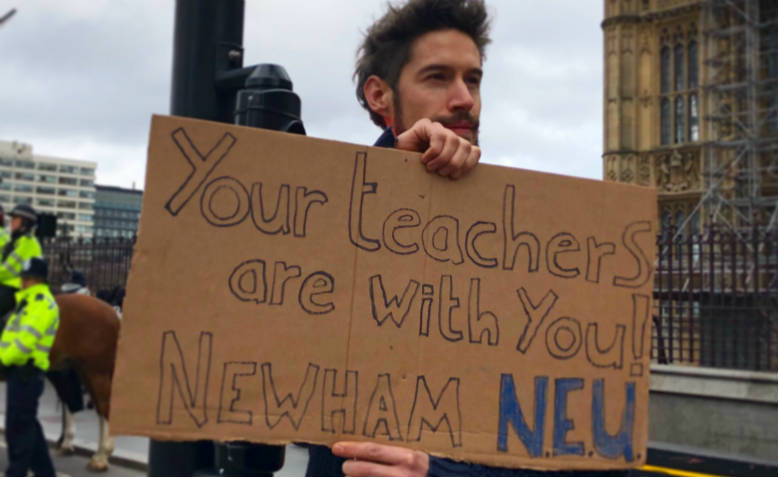 Newham NEU teacher supporting the climate strike. Photo: Shabbir Lakha
Newham NEU teacher supporting the climate strike. Photo: Shabbir Lakha
At a climate emergency conference organised by the National Education Union, teachers and union activists discussed how to build the movement against climate change, reports Orlando Hill
In a packed auditorium in Regent High School in Camden with teachers and students (from secondary schools and universities) overflowing into the aisles, Noga Lesy-Rapport from the UK Student Climate Network, and a leading figure in the school strikes kicked off the opening plenary “Education for the Future” by explaining how we can create an education system fit for the climate crisis, and how education workers can show solidarity with student strikers.
The National Education Union (NEU) conference in April had agreed to hold such an event. Student strikes have pushed the climate emergency to the top of the political agenda. The aim was to explore what climate breakdown meant for education, how we could re-shape the curriculum and how educators and students can come together to take action for climate justice. The conference was co-organised with the University and College Union (UCU) and the National Union of Students (NUS).
Professor Carole Parkes from the University of Winchester was the second to speak. According to her, the problem is with the economic system. Continuing with business as usual is no longer an option. Everyone has a role to play in it and universities should be in the vanguard. We cannot simply rely on the government for solutions. Although it is important, it is not enough to declare a climate emergency. It has to be taken further. It has to involve changing systems and not just tweaks. Therefore, it must be a collective effort. She reminded us that there were “1,908 days to 2025”, the deadline for us to reach a carbon-neutral economy.
Parkes went on to explain that we have to change the formal curriculum so that it fits the climate crisis, but that was not enough. We also have to change the informal curriculum, what happens around the curriculum. How do we change the extracurricular activities so that it also responds to the challenges of climate change? It is no good teachers and students tackling climate change in the formal and informal curriculum, but then not introduce what they have learned into their lives and campaigning efforts.
Worrying solely about how much a student earns is no longer appropriate. Paraphrasing Professor David Orr, there is nothing more dangerous to the biosphere than a bunch of smart, degree-holding, but ecologically illiterate, Homo sapiens who are eager to succeed.
Sakina Shiekh (Labour for a Green New Deal) stated that climate is a class and race issue. It is a struggle of workers against greedy bosses and lazy incompetent politicians. Sustainability should not be something we teach and learn in geography. We have to develop an understanding of history so we can understand how we got here, how our economic system developed. Fighting climate change goes hand in hand with the struggle for socialism. Working class and people of colour are the ones that most suffer from climate change. Secondary students in their activism have shown that they deserve the right to vote. It is clear that 16 year-olds should have the right to vote. “Their leadership has been inspiring.”
Kevin Courtney (NEU Joint General Secretary) believes that change always comes from below. The fight against climate change is an urgent international movement. People are dying now from the consequences of climate change. How do the rich want to tackle climate change? By buying houses in New Zealand or stopping people in the developing world from travelling.
There were 29 workshops during the conference covering very practical topics such as: declaring a climate emergency in schools, making banners, reforming the curriculum, building workplace reps for environmental conditions and using art to explore extractivism.
The workshop on building workplace reps for environmental conditions was led by Catherine Boothman from the NEU and Sarah Woolley from Bakers Food and Allied Workers Union. Throughout the conference, the importance of building links and working along with other unions was emphasised.
The conference was a good start to discussing ideas on how the organised labour movement can work together with school students and climate campaigners to build the climate movement and bring class politics into it.

